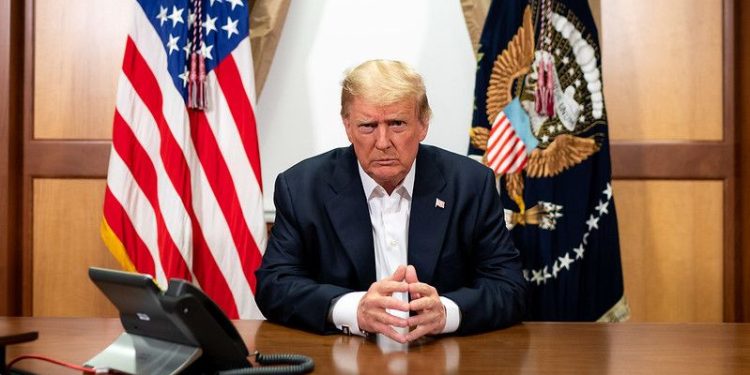Jakarta, Indonesia Sentinel — The White House has released a framework for the new trade agreement between the United States (U.S.) and Indonesia on reciprocal tariffs. Previously, US has decided to lower the import tariffs on Indonesian goods to 19%, followed by several trade deal.
“President Donald J. Trump has announced a major trade deal with Indonesia that will give American citizens access to markets previously thought impossible to reach, and will open breakthrough opportunities for U.S. manufacturing, agriculture, and the digital sector,” read the official White House statement released Wednesday, July 23, 2025.
According to the White House website, the agreement includes a commitment from Indonesia to implement a reciprocal tariff rate of 19%. The lowered tariffs followed by eight key provisions.
1. Elimination of Tariff Barriers
Under the agreement, Indonesia has pledged to eliminate tariff barriers on over 99% of U.S. exports across all sectors. These sectors include agriculture, healthcare products, seafood, information and communications technology, automotive goods, and chemicals.
The White House emphasized that this move will open “commercially meaningful market access for all categories of U.S. exports” and support the creation of high-quality American jobs.
2. Removal of Non-Tariff Barriers on U.S. Industrial Exports
The deal also targets non-tariff barriers, with Indonesia agreeing to take the following nine :
- Exempt local content requirements for U.S. companies and their products.
- Accept U.S. federal vehicle safety and emissions standards for automotive imports.
- Accept FDA certifications and pre-market authorizations for American medical devices and pharmaceuticals.
- Exempt cosmetics, medical devices, and other manufactured goods from burdensome certification and labeling rules.
- Eliminate import restrictions or licensing requirements on remanufactured U.S. goods and components.
- Remove pre-shipment inspection or verification requirements on American imports.
- Adopt and implement good regulatory practices in trade policymaking.
- Address long-standing U.S. concerns over intellectual property rights, as identified in the USTR’s Special 301 Report.
- Resolve U.S. concerns related to conformity assessment procedures.
3. Removal of non-tariff Barriers on U.S. Agricultural Exports
Indonesia has agreed to eliminate non-tariff barriers on U.S. agricultural exports through four key commitments.
First, the country will exempt American food and agricultural products from all of its import licensing regimes, including its commodity balance policy.
Second, Indonesia will ensure transparency and fair treatment regarding geographic indications, particularly for meat and cheese products.
Third, it will grant permanent Fresh Food of Plant Origin (FFPO) designations to all eligible U.S. plant-based products.
Fourth, accept U.S. regulatory oversight by listing all American meat, poultry, and dairy facilities, and accepting certificates issued by U.S. regulatory authorities.
4. Strengthen the Rules of Origin
The two nations will negotiate rules of origin to ensure that the agreement benefits solely to the United States and Indonesia, and not to third-party countries.
5. Elimination of Digital trade Barrier
Indonesia has committed to eliminating its existing Harmonized Tariff Schedule (HTS) lines for “intangible products” and will suspend associated import notification requirements.
The country will also support an unconditional and permanent moratorium on customs duties for electronic transmissions at the World Trade Organization (WTO).
Furthermore, Indonesia will take effective steps to implement the Joint Statement Initiative on Services Domestic Regulation, including submitting revised specific commitments for WTO certification.
Indonesia has also agreed to allow the transfer of personal data from Indonesia to the U.S., recognizing Washington as a jurisdiction that provides adequate data protection under Indonesian law.
Read Also:
Indonesia Continue Negotiations with U.S., Secure 0% Import Tariffs on Several Essential Commodities
6. Aligning Economic Security
The White House said Indonesia has committed to joining the Global Forum on Steel Excess Capacity and taking effective measures to address global overcapacity in the steel sector and its consequences.
The United States and Indonesia have also pledged to deepen cooperation to enhance supply chain resilience. This includes efforts to prevent tariff evasion, collaborate on export controls, and bolster investment security.
Additionally, Indonesia has agreed to lift export restrictions to the U.S. on all industrial commodities, including critical minerals.
7. Raising Labor Standards
Indonesia has committed to adopting and enforcing a ban on the import of goods made with forced labor. The country also pledged to remove legal provisions that limit workers’ and labor unions’ rights to freedom of association and collective bargaining.
8. Signing Commercial Agreements
The United States and Indonesia highlighted upcoming commercial agreements across the agriculture, aerospace, and energy sectors, with deals expected to boost American exports to Indonesia.
According to the White House, both countries are expected to sign the agreement regarding the reciprocal tariff in the coming weeks.
(Raidi/Agung)


























